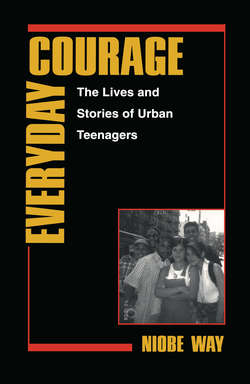Читать книгу Everyday Courage - Niobe Way - Страница 15
На сайте Литреса книга снята с продажи.
Universal Theories
ОглавлениеA second bias found in developmental psychology that I tried to resist relates to what Jean-François Lyotard has called “metanarratives.” Lyotard, who has written extensively about postmodernism in literature and philosophy, presents a critique of metanarratives which he defines as attempts to explain a particular process by making reference to a “grand narrative” or overarching theoretical framework (e.g., Marxism or psychoanalysis).19 Lyotard claims that by relying on metanarratives, we tend to overlook the localized, shifting, and contextualized meaning that is present in everyday life. According to Lyotard, there are only local bases of understanding; there is no grand scheme or narrative that can explain it all. This rejection of metanarratives “refines our sensitivity to differences and reinforces our ability to tolerate the incommensurable.”20 Lyotard calls for the aim of science to be not for consensus but for “instabilities” or for “differences.”21
In my view, many developmental theories are similar to Lyotard’s metanarratives. Developmental metanarratives, as I will call those developmental theories that present a predominantly linear, universal, invariate, and progressive model of development, typically attempt to explain the whys, hows, and whens of human development across the lifespan or across a period within the lifespan. They create a story of development that tries to explain at the “meta” level the stages or sequences of development. These theories focus on describing underlying structures or themes in development that are purportedly universal. By definition, they attempt to describe a developmental process that is decontextualized, taken out of time and culture. Given the impact of context on both development and our understanding of it, the use of these metatheories to frame development for all people is problematic at best. The metanarratives of developmental psychology inevitably claim more than they actually provide.
My questions, as I come to understand these developmental metanarratives, are: What is left out of or missing in these theories? What types of experiences and complexities are neglected or obscured? What is not yet understood? Unlike Lyotard, I am not arguing for the rejection of these metanarratives, for they have clearly detected important developmental processes. Rather, I seek to expand our capacity to conceptualize valid theories and to determine good developmental research.
Sandra Harding, a feminist philosopher, tells us:
What we took to be humanly inclusive problematics, concepts, theories, objective methodologies, and transcendental truths are in fact far less than that. Indeed these products of thought bear the mark of their collective and individual creators and the creators in turn have been distinctively marked as to gender, class, race and culture.22
The metanarratives in developmental psychology cannot be challenged on the grounds that they are “marked” by such factors as gender, race, and class; all theories are marked. Instead, they can be contested on the grounds that not only do they deny their marked status, but they also inherently discourage “sensitivity to difference” in development. Considering Gadamer’s and Heidegger’s suggestions that all interpretive efforts operate within a hermeneutic circle, and combining their ideas with Lyotard’s and Harding’s, it becomes clear that an openness to the unexpected and the unfamiliar cannot be maintained if one listens only for what is expected theoretically. How can one hear differences if one’s ears are attuned only to that which is familiar or seemingly universal?
In my own work, I have been acutely aware of the professional demands to position my study within the rubric of a validated developmental metanarrative. Using such a universal framework to ground my research, however, was at odds with the purpose of my investigation. How could I put the stories of a sample of adolescents who have rarely been studied into a framework that had been developed in a different context and time? Why would I use a theory that either bears no relationship to these adolescents’ realities, or specifically denies their realities in its search for universals? Although existing developmental theories are fundamental to our very definitions of development, and do successfully, at times, identify what seem to be common experiences within and across certain groups, I resisted listening with only one ear. I listened with both ears—the one familiar with existing “developmental metanarratives” and the other attentive to something new and unexpected. I listen with what Kierkegaard in the nineteenth century called a “passion for what is possible.”
